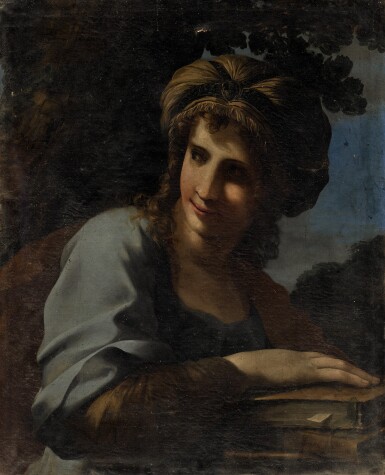Master Paintings & Sculpture Day Sale
Master Paintings & Sculpture Day Sale

Property of a Distinguished European Private Collection
GIOVANNI FRANCESCO ROMANELLI, CALLED VITERBESE | A SYBIL, BUST LENGTH, LOOKING LEFT AND RESTING HER HAND ON BOOKS
Auction Closed
January 30, 06:45 PM GMT
Estimate
150,000 - 200,000 USD
Lot Details
Description
Property of a Distinguished European Private Collection
GIOVANNI FRANCESCO ROMANELLI, CALLED VITERBESE
Viterbo circa 1610 - 1662
A SYBIL, BUST LENGTH, LOOKING LEFT AND RESTING HER HAND ON BOOKS
oil on canvas
30 by 24½ in.; 76 by 62 cm.
Anonymous sale, New York, Sotheby's, 24 January 2008, lot 49;
There acquired for $265,000.
Giovanni Franceco Romanelli was born in Viterbo and moved early to Rome where he was part of the circle of artists and intellectuals protected by Pope Urban VIII and Cardinal Francesco Barberini. He was first recorded as a pupil of Domenichino (1582 - 1641) and, in 1631, as the assistant to Pietro da Cortona (1596 - 1669) on the decoration of the Palazzo Barberini. He enjoyed a good reputation and received important commissions including a cycle of frescoes for the Vatican. Simultaneously, he worked under Gianlorenzo Bernini (1598 - 1680) and decorated several Roman churches and palaces.
In 1644, the death of Urban VIII led to the fall and exile of the Barberini family. From 1646 to 1647, with the help of Cardinal Barberini, Romanelli travelled to Paris where he was asked to decorate the gallery of Mazarin House (today known as the National Library) illustrating the history of Rome. He was again called to Paris from 1654 to 1657 to paint the ceilings of the apartments of the Queen Regent, Anne of Austria, in the Louvre.
At the time of the 2008 sale, Dr. Ursula Fischer Pace endorsed the attribution to Giovanni Francesco Romanelli on the basis of photographs and proposed a date of execution circa 1654-1657. In her opinion, the colors are very delicate and typical of the artist during his second stay in France. Also typical are the bust-length format and distinctive red lips of the Sybil, see for example Romanelli's 1640 St. Cecilia (Capitoline Museum, Rome, inv. no. 186), with a pose mirroring the present subject and similar facial features and lips.
